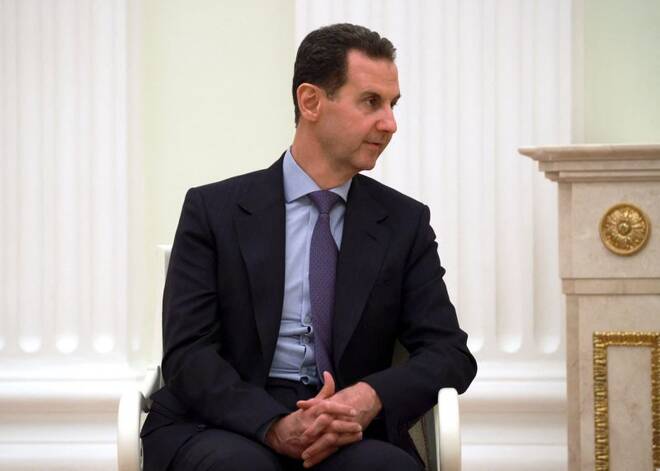Advertisement
Advertisement
Saudi Arabia to invite Syria’s Assad to Arab leaders summit
By:
By Aziz El Yaakoubi and Maya Gebeily RIYADH/BEIRUT (Reuters) - Saudi Arabia is planning to invite Syrian President Bashar al-Assad to an Arab League summit that Riyadh is hosting in May, three sources familiar with the plans said, a move that would formally end Syria's regional isolation.
By Aziz El Yaakoubi and Maya Gebeily
RIYADH/BEIRUT (Reuters) – Saudi Arabia is planning to invite Syrian President Bashar al-Assad to an Arab League summit that Riyadh is hosting in May, three sources familiar with the plans said, a move that would formally end Syria’s regional isolation.
Saudi Foreign Minister Prince Faisal bin Farhan will travel to Damascus in coming weeks to hand Assad a formal invitation to attend the summit scheduled for May 19, two of the sources said.
The Saudi government’s communication office and the foreign ministries of both countries did not respond to requests for comments.
Gamal Roshdy, spokesperson for the Arab League secretary general, said the organisation is not privy to every move on the bilateral level between Arab countries.
“We are not supposed to be informed in advance about the assumed visit,” he added.
Assad’s attendance at an Arab League summit would mark the most significant development in his rehabilitation within the Arab world since 2011, when Syria was suspended from the organisation. Assad had been boycotted by many Western and Arab states over his brutal crackdown on protests – violence that led to a protracted civil war.
Syria’s return to the 22-member body would be mostly symbolic but it reflects a change in the regional approach towards the Syrian conflict. Hundreds of thousands of people have died in the war, which drew in numerous foreign powers, and splintered the country.
Last month sources told Reuters Riyadh and Damascus had reached an agreement to reopen their embassies after the Muslim holy month of Ramadan. The Saudi foreign ministry did not confirm an agreement was reached but said it was in talks with the Syrian foreign ministry to resume consular services.
One of the three sources said discussions have been ongoing for more than a year over a list of demands from Saudi Arabia for the Syrian government to meet as a condition to mend ties, including close cooperation on border security and drug trafficking.
Initial discussions for a visit by Prince Faisal to Damascus or by Syrian Foreign Minister Faisal Mekdad to Riyadh were postponed because of the earthquakes that hit Turkey and Syria in February, one of the sources said.
Arab League heavyweight Egypt has also resumed contacts with Assad. Both sides agreed to strengthen cooperation on Saturday during the first official visit by a Syrian foreign minister to Cairo in over a decade.
An Egyptian security source told Reuters the visit was aimed at putting in place steps for Syria’s return to the Arab League through Egyptian and Saudi mediation.
Some countries, including the United States and Qatar, have opposed the normalisation of ties with Assad, citing his government’s brutality during the conflict and the need to see progress towards a political solution in Syria.
Contacts between Saudi and Syrian officials gathered momentum following a landmark agreement in March between Saudi Arabia and Iran, Assad’s main backer, to re-establish ties.
The rapprochement between Riyadh and Tehran is part of major regional realignment, amid rising tensions between Iran and Israel.
Israeli forces carried out air strikes on outposts in Syria’s Homs province in a raid early on Sunday, Syria’s defence ministry said, while Western intelligence sources said a series of air bases in central Syria where Iranian personnel are based were hit in the bombings.
(Additional reporting by Samia Nakhoul in Dubai and Aidan Lewis in Cairo; Editing by Frances Kerry)
About the Author
Reuterscontributor
Reuters, the news and media division of Thomson Reuters, is the world’s largest international multimedia news provider reaching more than one billion people every day. Reuters provides trusted business, financial, national, and international news to professionals via Thomson Reuters desktops, the world's media organizations, and directly to consumers at Reuters.com and via Reuters TV. Learn more about Thomson Reuters products:
Did you find this article useful?
Latest news and analysis
Advertisement
